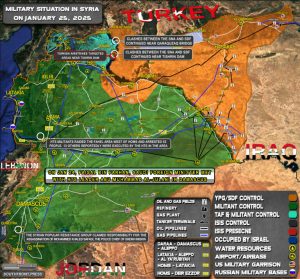Intense clashes were once again reported Saturday in northern Syria’s Aleppo Governorate, with Turkish-backed SNA militants attacking Kurdish SDF fighters in the area near the Tishreen Dam, which Turkey and the SNA has been unsuccessfully trying to capture for weeks now.
SDF reports suggested Saturday’s attacks were no more successful than previous ones, and said that 20 SNA fighters were killed in various clashes between Manbij and the Dam, along with nine others wounded. They did not report the casualties on their own side.
Sunday marks “Kobani Victory Day” in the SDF’s territory, which marks the 10th anniversary of the SDF and Kurdish resistance defeated ISIS in the city of Kobani. ISIS was pushing to seize Kobani in late 2014, and though actual ISIS attempts to conquer the city ended in early 2015, they continued to attack it intermittently for months after, killing hundreds of civilians.
This means a growing number of protesters rallying at Tishreen Dam, where they are calling for an end to Turkish attacks and calling for international efforts to stop the strikes in general. They have repeatedly warned attacks on the Dam would cause humanitarian crisis in northeastern Syria.
And with more protesters, this apparently was a time for Turkey to bomb the site once again. There are reports of injuries among demonstrators though so far no confirmed fatalities. Turkish attacks on protesters at the Dam last week killed a number of people, including a top PYD political leader.
The Tishreen Dam and the Tabqa Dam further downriver are major sources of freshwater and electricity across northeast Syria. Both are controlled by Kurdish forces and it has been reported Turkey intends to take those dams and use that control to force the SDF to agree to disarm.
Turkish President Erdogan has long sought to eliminate the SDF’s presence in Syria, and indeed was backing Syrian rebels even early in the civil war on the idea that a Sunni Arab-dominated government would be more hostile to Kurdish attempts at autonomy.
The Sunni Islamist Hayat Tahrir al-Sham (HTS) now effectively runs Syria, so Turkey got their wish in that regard. HTS leadership has said they’re “not seeking bloodshed” with the SDF, but are also denouncing the idea of continued Kurdish autonomy. Moreover, the HTS leader has accused the SDF of using captured ISIS fighters as “blackmail” against the rest of Syria.
Erdogan’s long-standing problem with the very idea of Kurdish autonomy is also risking bumping up against Turkey’s economic ambitions for Syrian reconstruction after they managed to back the HTS regime change.
Major Turkish companies stand to gain hundreds of billion dollars in new construction contracts. Indeed Turkish steel and cement maker stocks have surged in the last month on anticipation of that building surge. Turkey also expects to use Syrian routes to replace more expensive Egypt routes for their exports to the Middle East, potentially earning even more money on the regime change there.
That all is a big boon for Turkey, but it depends on Syria actually stabilizing after the regime change. That’s not guaranteed to happened, and Turkey and the SNA’s constant needling on the Kurds is only increasing the risk that Syria is just going to descend into a new era of instability fresh off the old era of instability. Turkey may ultimately find they can’t have both a crackdown on the Syrian Kurds and prosperity from a stable Syria where the HTS rulers are grateful for Turkey’s help in seizing power.



